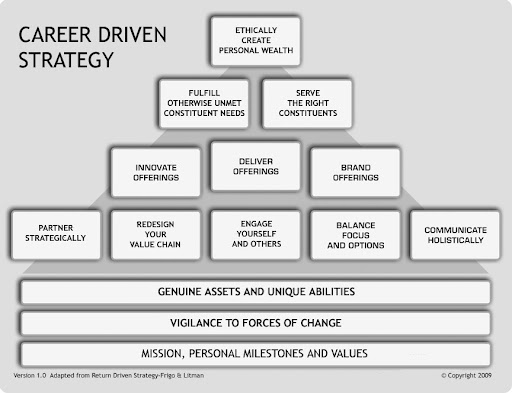This all-important tenet of business strategy is key to steering a business in the RIGHT direction!
| From the desk of Miles Everson: Hello and happy Tuesday! Welcome to today’s “Return Driven Strategy (RDS)!” For those of you who don’t know yet, RDS is a pyramid-shaped framework with 11 tenets and 3 foundations. When applied properly, these principles help businesses and even individual professionals achieve their objectives. Today, let’s continue on with our discussion about the 3rd foundation of RDS. Keep reading to know the importance of relating disciplined valuation and performance measurement to the tenets and foundations of RDS. |
This all-important tenet of business strategy is key to steering a business in the RIGHT direction! Businesses are driven in the direction they are steered… and performance measures provide such a steering, guiding the organization into activities that are monitored in measurable results. However, what is the long-term direction in which a company must be guided? According to Professor Joel Litman and Dr. Mark L. Frigo in the book, “Driven,” their research behind the Return Driven Strategy (RDS) framework tells them the highest tenet of business strategy: Ethically Maximize Wealth They say companies that abide by this rule ALWAYS show better financial results over long-term periods. Meanwhile, firms that do not live by this guiding principle comprise some of the worst financial performers ever.
Now… Given the importance of this tenet to success, what are key performance measures that can guide and drive a firm’s execution toward superior results? For Professor Litman and Dr. Frigo, lagging and leading indicators are described in disciplined performance measurement. —lagging indicators help to understand what has happened in the past. Leading indicators provide insight to what may happen in the future. That’s why they believe attention to and balance of these types of performance measures are important for any organization. Besides, in ethically maximizing wealth, companies must ensure that its business activities are aligned toward maximizing shareholder wealth. Such activities must be done within the ethical parameters of the communities in which a company operates, or undue risk can completely kill a company’s valuation and ability to stay in business. So… what performance measures can help ensure a company’s attention to this all-important tenet of business strategy? Allow us to share with you two for now:
Because of this, every business must employ methods for tracking its ability to generate free cash flows over time to increase its DCF-based valuation. Two important financial drivers measure trend and level of cash flow performance: First , whether publicly or privately owned, investors need to know how much asset or investment growth is being made by management period-by-period. Second , investors need to understand how much cash the firm can generate over and above the investments it is making. Depending on the industry and nature of the business, Professor Litman and Dr. Frigo say there are various ways of measuring investment and reinvestment in a firm. … and there are also different ways of measuring the return on those investments! The nature of these calculations must be dependent NOT on some theoretical basis, but on an understanding of exactly how the metrics will be used to ensure plans are executed. Are you familiar with the Balanced Scorecard framework ? According to Professor Litman and Dr. Frigo, this widely used framework is popular for directing management toward monitoring financial and non-financial measures of performance. … and while the logic of the Balanced Scorecard is valid, management still must ensure that strategic objectives and performance measures reflect the first tenet of RDS, or a manager must question a firm’s ability to produce respectable returns for its shareholders. After all, in well-designed Balanced Scorecards, certain measures explicitly target the tenet of ethically maximizing wealth. — If you’re looking to gain a better understanding of Return Driven Strategy and Career Driven Strategy, we highly recommend checking out “Driven” by Professor Litman and Dr. Frigo. Click here to get your copy and learn how this framework can help you in your business strategies and ultimately, in ethically maximizing wealth for your firm. Hope you found this week’s insights interesting and helpful. EXCITING NEWS AHEAD The world of work has shifted, and there’s no going back. The barriers to entry have never been lower for talented professionals to work independently, and today’s massive external workforce is hardly a pandemic-produced fad. Business owners can only survive in the new work landscape by partnering with this deep talent pool. With decades of experience in both small-business entrepreneurship and executive management at PwC, I truly believe that the future of work is independent. With that, I’m happy to share with you that my book, co-authored with Walter Scott Lamb, is now available on Amazon! Free Birds Revolution: The Future of Work & The Independent Mind This new bestseller is an essential read for both independent professionals and corporate executives. Here, we provide educational and practical guides to unpack the ever-growing workforce and offer you crucial ways to become a client of choice. Click on the link above to order your copy. Let this bestselling book help you future-proof your career and organization in the new world of work. Stay tuned for next Tuesday’s Return Driven Strategy! In a world where everything is built on and held together by intricate systems and millions of lines of code, security is no longer optional. A few lines of vulnerable or malicious code could spell the difference between disaster and safety. Learn more about the importance of vigilance to forces of change in next week’s article! |

Miles Everson
CEO of MBO Partners and former Global Advisory and Consulting CEO at PwC, Everson has worked with many of the world's largest and most prominent organizations, specializing in executive management. He helps companies balance growth, reduce risk, maximize return, and excel in strategic business priorities.
He is a sought-after public speaker and contributor and has been a case study for success from Harvard Business School.
Everson is a Certified Public Accountant, a member of the American Institute of Certified Public Accountants and Minnesota Society of Certified Public Accountants. He graduated from St. Cloud State University with a B.S. in Accounting.



